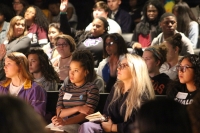Race Project KC
Johnson County Library, Kan.
Innovation Synopsis
Race Project KC is a social justice initiative focused on the role of systemic racism in the United States and, more specifically, redlining, blockbusting and racial restrictive covenants. Designed for students in grades nine through 12, Race Project builds from the text Some of My Best Friends are Black: The Strange Story of Integration in America.
Challenge/Opportunity
Racial disparity persists in every system across the country, without exception. Johnson County neighborhoods were developed as all-white enclaves on the periphery of Kansas City. Johnson County Library seeks to mitigate this history by building awareness of racially restrictive covenants and the dire impact the policies have had on communities. Schools are paired together at monthly workshops covering implicit bias, healthy equity and wealth disparities. Partners include local artists, educators and museums.
Key Elements of Innovation
The initiative brings students and educators together from across state, county, urban and suburban lines. Students participating identify as black, white, mixed race, Indian (India), Latino, Asian and Middle Eastern. Every major school district is represented. Dozens of collaborating agencies across Johnson County (Kan.), Douglas County (Kan.), Kansas City (Mo.) and Kansas City (Kan.) provide content, facilitation and leadership for student workshops and events. Featured authors in 2019 included Jacqueline Woodson and TaNehisi Coates.
Achieved Outcomes
In 2019, Race Project students wrote intros and introduced each featured national author. Local university students lead discussions for monthly workshops and the annual student symposium. Each was established and prioritized at the request of students participating in 2018 workshops and events, per a student survey. Ninety-five percent of students increased their understanding of racial equity and systematic racism. Ninety percent were able to demonstrate leadership characteristics like community consciousness and responsibility.

